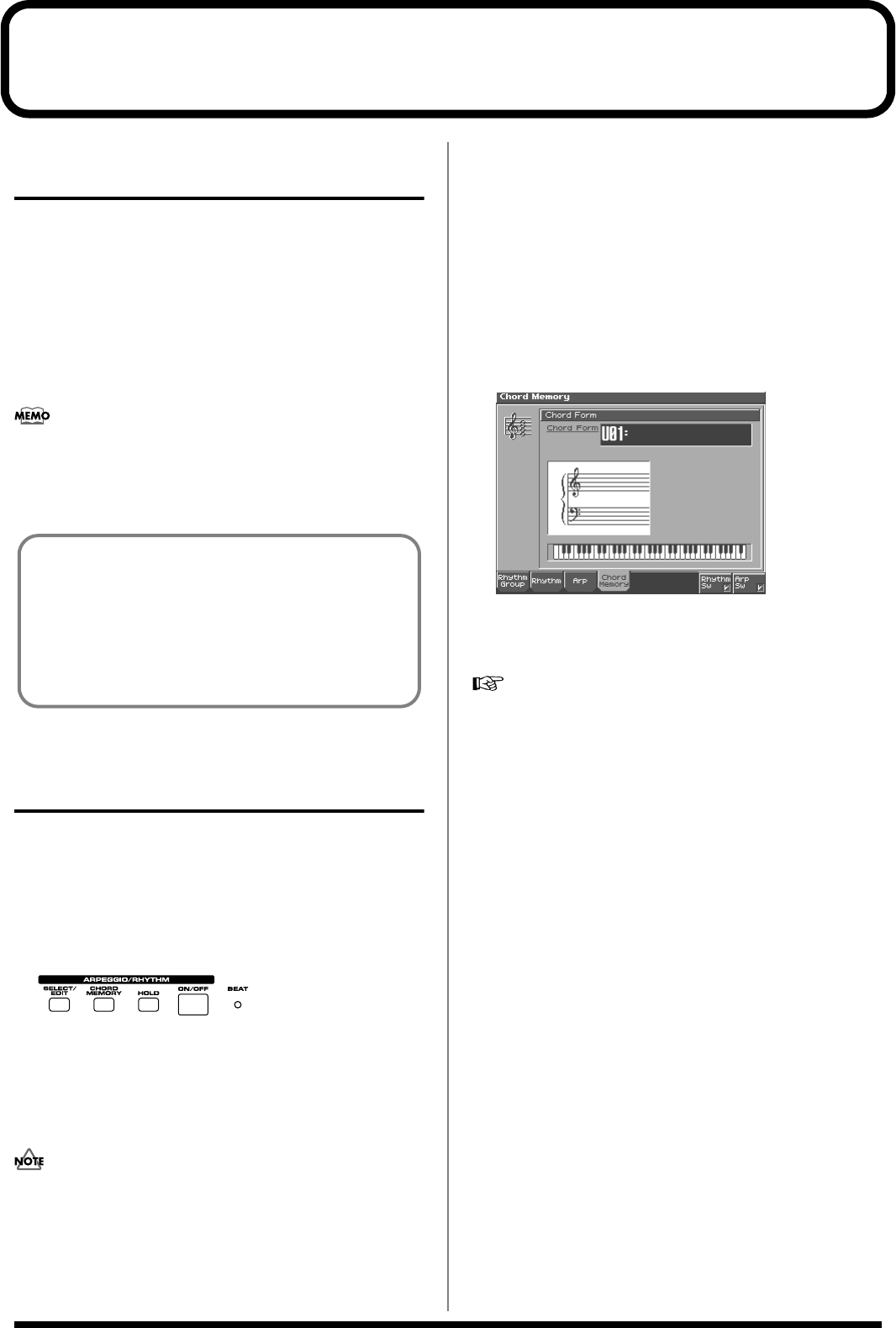
110
Using the Chord Memory Function
(CHORD MEMORY)
About the Chord Memory
Function
Chord Memory is a function that allows you to play chords based on
pre-programmed
Chord Forms
, just by pressing a single key on the
keyboard. The Fantom-S can store 64 preset chord forms and 64 user
chord forms. If you wish, you can overwrite any of the 64 user
(factory set) chord forms.
The chord memory function operates on the arpeggio part in
Performance mode. If a rhythm set is selected for that part, you can
also use this to play rhythms.
* You cannot use the chord memory function with the pads.
When you press the C4 key (Middle C), the chord is played
using the exact chord structure recorded in the Chord Form. This
is referenced to the C4 key; parallel chords are played by
pressing other keys.
Performing with the Chord
Memory Function
Turning Chord Memory Function On
and Off
1.
Press ARPEGGIO/RHYTHM [CHORD MEMORY] to turn on
the Chord Memory function.
The button is lighted.
fig.Arp button
2.
Play the keyboard.
A chord will sound according to the currently selected chord
form.
3.
To finish playing arpeggios, press [CHORD MEMORY] again
so the indicator turns off.
you use the Chord Memory function with a tone for which the
Mono/Poly Parameters (p. 58) is Mono, only one sound in the
chord is played. When using the Chord Memory function to turn
Poly the Mono/Poly Parameters (p. 58).
Selecting Chord Forms
This selects the
Chord Form
to which the sounds making up the
chord being played are registered when the Chord Memory function
is used.
It can be saved to individual in Performance mode.
1.
Press ARPEGGIO/RHYTHM [SELECT/EDIT].
2.
Press [4 (Chord Memory)].
The following screen appears.
If Performance mode is selected, (Performance) will appear at
the right of “Chord Form.”
fig.Chord01_50
3.
Either turn the VALUE dial or use [INC]/[DEC] to select a
Chord Form number.
The notes of the chord will be displayed.
For more on the Chord Forms pre-programmed at the factory,
refer to the “Sound Parameter List.”
4.
When you have finished selecting a Chord Form, press
[Exit].
*A Chord form is not part of any Performance, but rather independent
data; you can store up to 64 Chord forms. You can use a single Chord
form in different Patches and Performances at the same time.
A performance contains a number by which these chord forms are
recalled; these numbers are saved individually for each performance (p.
96).
* To save the selected Chord Form number, press [WRITE] and carry out
the write procedure (p. 111).
*A patch cannot store the number by which an arpeggio style is recalled.
Using in Combination with the Arpeggio
Function
When performing with the Chord Form function, you can also
use it along with the Arpeggio function (p. 104). After first
storing complex Chord Forms in memory, you can then call
them up when Arpeggio is on, and you can easily create
complex arpeggio sounds just by pressing a single key.
Reference_e.book 110 ページ 2003年7月14日 月曜日 午後3時25分


















